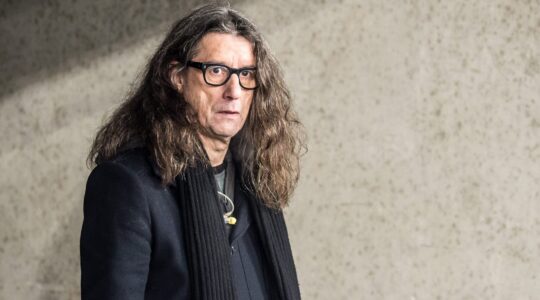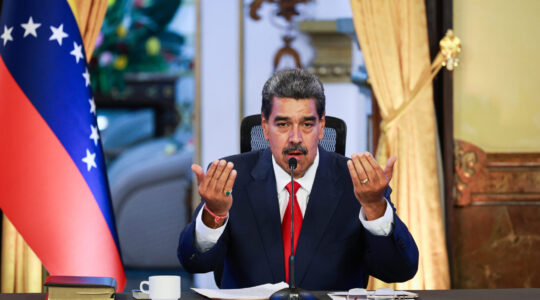MADRID (JTA) — A convention hosted by Vox, Spain’s far-right party that has been criticized for welcoming neo-Nazis, counts Israel’s Minister of Diaspora Affairs Amichai Chikli among its featured speakers this weekend.
Chikli is appearing at Europa Viva 24, a conference joining Europe’s rightwing leaders and more than 10,000 attendees on Saturday and Sunday in Madrid. For Chikli, a member of Prime Minister Benjamin Netanyahu’s right-wing Likud party, it’s the latest stop in a tour of engagements with European politicians who advocate pro-Israel positions from parties with antisemitic and neo-Nazi roots.
Both Chikli and Javier Milei, Argentina’s new right-wing, pro-Israel president, were invited to address the conference. In his speech, Chikli lambasted Spanish Prime Minister Pedro Sanchez, who has sharply criticized Israel’s war against Hamas, which Chikli called “an existential battle for the future of humanity.”
In Spain, Vox is controversial both for its platform — which includes restricting abortion access, repealing domestic violence laws and shuttering the ministry of equality — and for a history of neo-Nazis in its ranks. Five years ago, the party nominated Holocaust revisionist Fernando Paz as a congressional candidate. Paz has said the facts of the Holocaust are “far from being established with accuracy” and called the Nuremberg trials a “farce.”
Vox is also home to Jordi de la Fuente, a member of the Barcelona government who previously led the neo-fascist Republican Social Movement, which dissolved in 2018. Other Vox members have included José María Ruiz Puerta, who led the neo-Nazi group CEDADE, and José Ignacio Vega Peinado, who was part of the neo-Nazi group Radical Action in the 1990s and received prison time for attacking and permanently disabling a professor at the University of Valencia.
Pedro Valera, a leader of Spanish neo-Nazism who has served jail time for disseminating hate speech, also recently appeared at Vox’s closing campaign ceremony in Barcelona.
Until recently, officials in the Likud party were discouraged from promoting alliances with Vox. In 2019, Netanyahu’s then-foreign affairs director Eli Hazan tweeted his support for the party and faced enough backlash to delete and apologize for the post.
But those boundaries have disappeared under Israel’s current right-wing government. In December, Chikli met with Vox president Santiago Abascal, whom he called “a man of truth who, in the twilight of Western civilization, where moral relativism threatens to collapse it, stands as a beacon of moral clarity.”
Last month, Chikli attended CPAC Hungary and praised Hungarian Prime Minister Viktor Orban, a longtime ideological ally of Netanyahu’s, as a “supporter of Israel.” (The authoritarian leader has been condemned by US antisemitism envoy Deborah Lipstadt for “rhetoric that clearly evokes Nazi racial ideology,” as well as by Hungarian rabbis.) Chikli spoke alongside Tom Van Grieken, president of Belgium’s Vlaams Belang party, which promotes the “Great Replacement” conspiracy theory and uses the Nazi term “omvolking” (“repopulation”), mainly referring to European immigration from Muslim countries.
Chikli also met earlier this year with Sweden’s far-right party, the Swedish Democrats. The second-largest party in the Swedish parliament, it has a history of Nazi founders and its members have been criticized for connections with neo-Nazi movements even in recent years. Israel has so far avoided establishing official ties with the party, but the Swedish Democrats have declared it “the most pro-Israel party in Sweden.”
Chikli’s ministry is charged with engaging and supporting the half of Jews who do not live in Israel; he added fighting antisemitism to its mandate when he assumed the position last year. But while Chikli is strengthening his bond with far-right European parties, he has said that he is not interested in building a relationship with some Jews around the world.
In January, at a conference hosted by the European Jewish Association in Krakow, Chikli said his official capacity would not induce him to build alliances with Diaspora Jews who participate in international protests against Israel’s military campaign in Gaza.
“A Jew who feels at home surrounded by a mob that is shouting, ‘From the river to the sea, Palestine will be free,’ I don’t consider him a Jew,” Chikli told the Jewish Telegraphic Agency. “I don’t want to build a bridge with him.”






